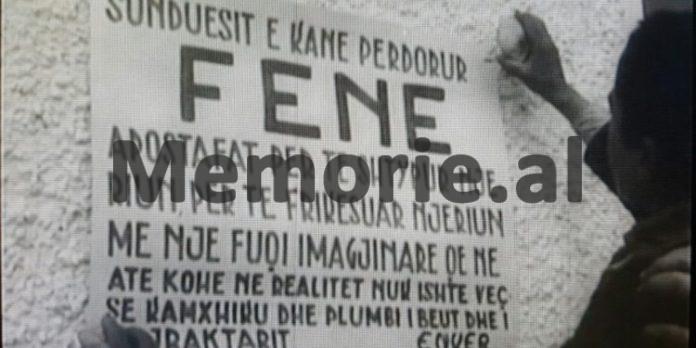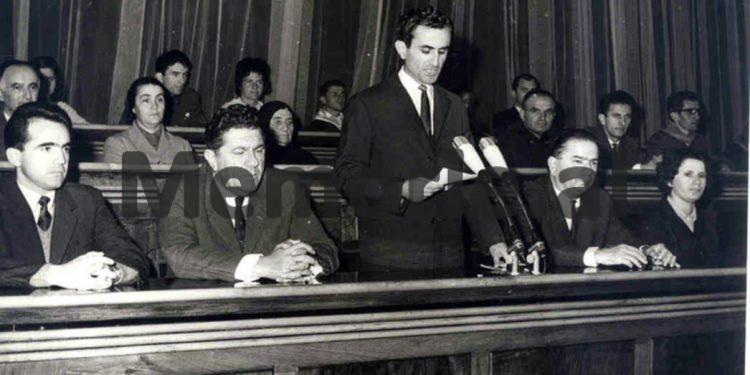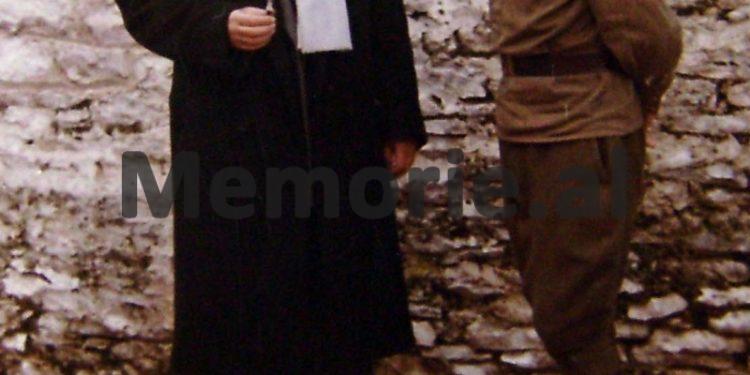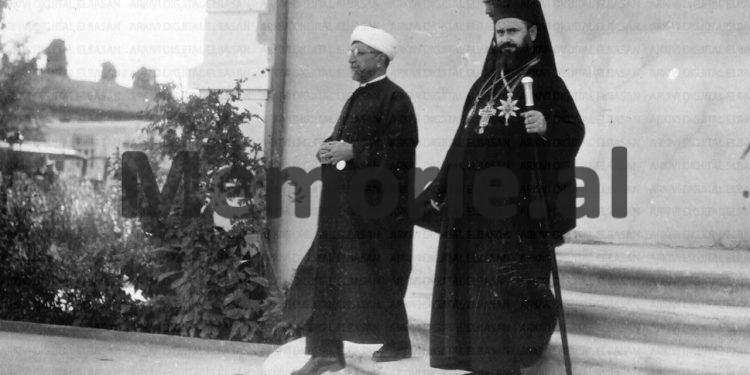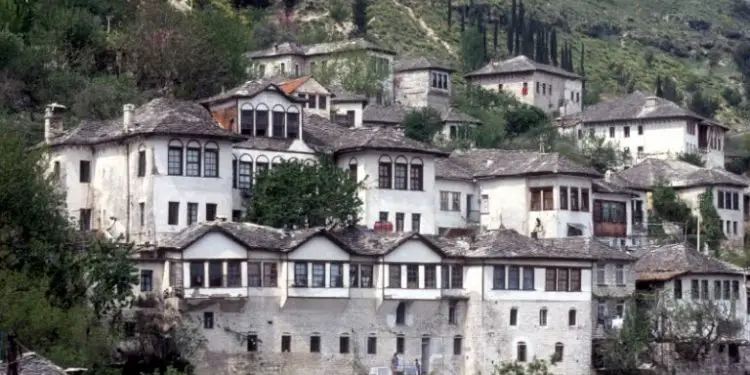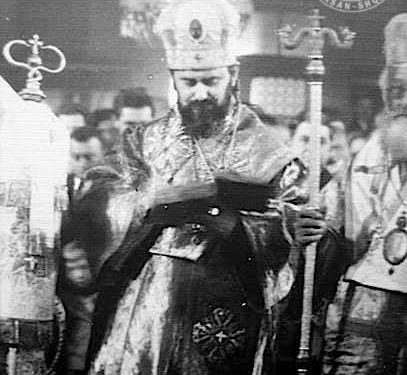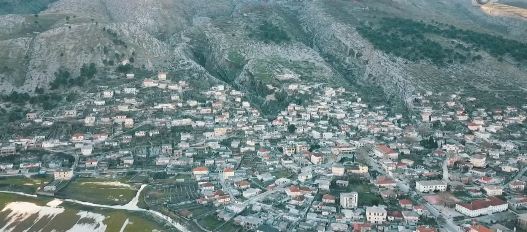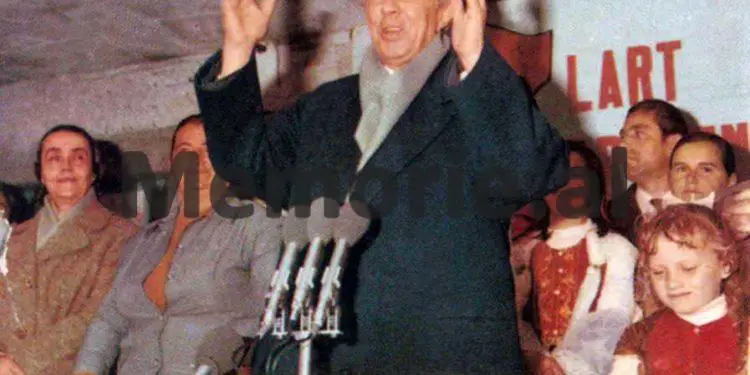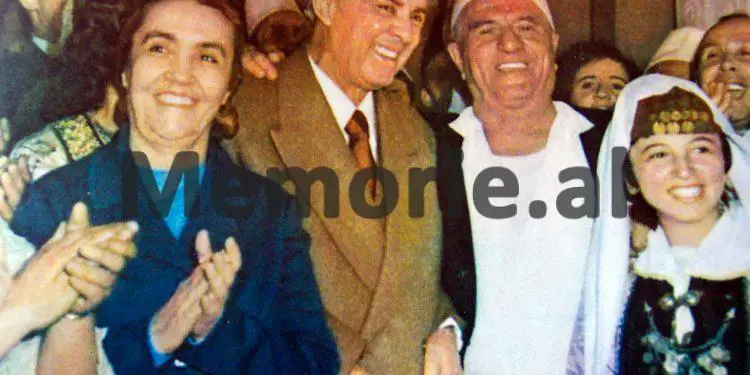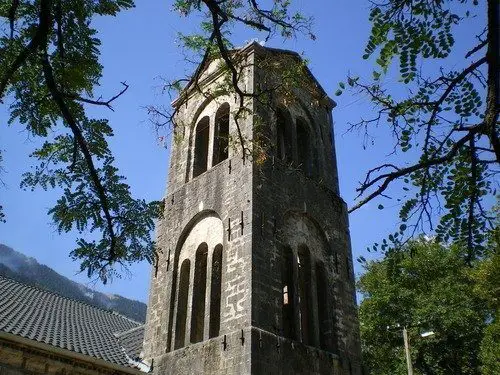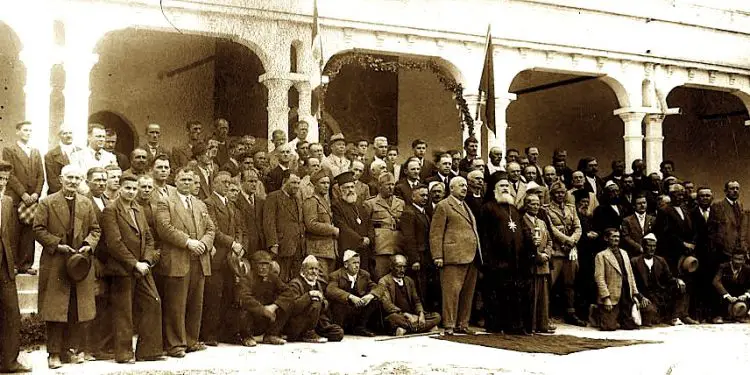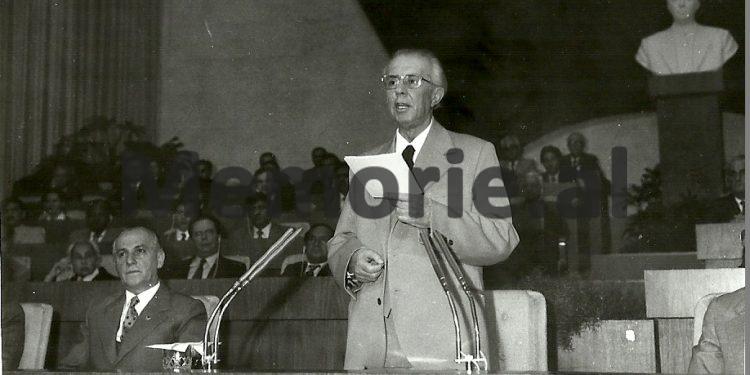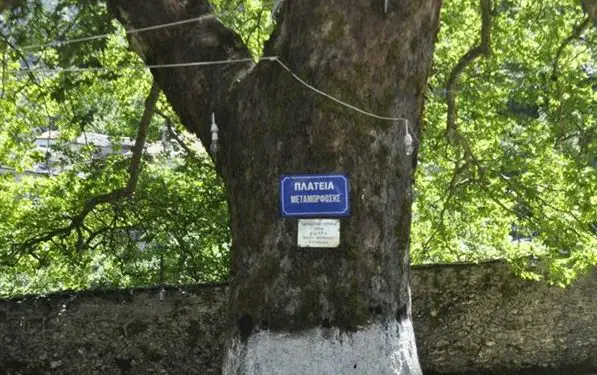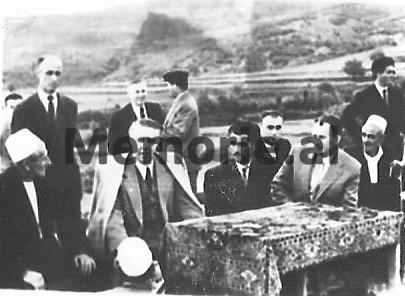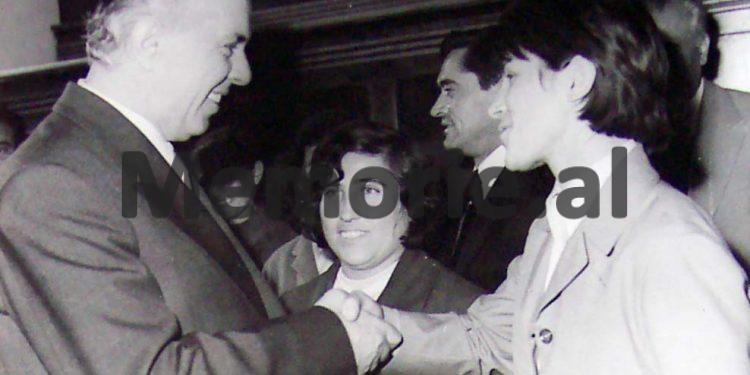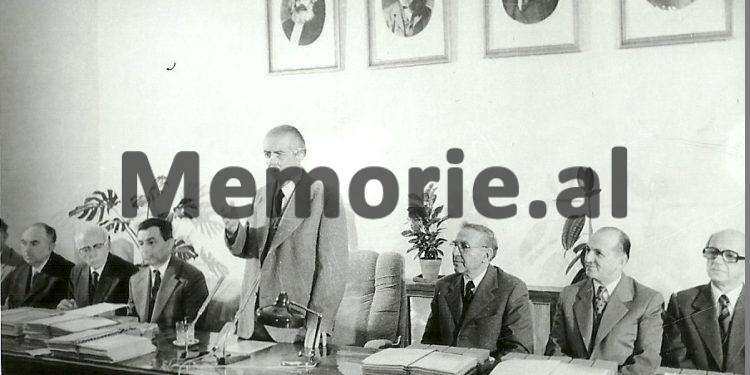Dashnor Kaloçi
Memorie.al publishes an unknown document with the initials “secret” issued by the Central State Archive, the fund of the former Central Committee of the ALP, where it is about a letter dated April 30, 1967, where The first secretary of the Party Committee of the Gjirokastra district, informs the Education Sector at the apparatus of the Central Committee of the ALP headed by Ramiz Alia, regarding the measures they had taken to prevent the celebration of Easter in the villages of the Greek minority of the Dropull area, such as Sotira, Rëza e Zeza, Kakavija, Pogoni, etc. How did they manage to stop that religious holiday by making it a working day and celebrating April 25, Border Day, and the provocations made to them by the Greek border post, where on Easter day, “20 degenerate girls in dresses had gathered short ones, who danced with the monarcho-fascist soldiers of the border post, who shouted at our villagers, saying: “why did they go to work for Easter” ?!
The decision taken by the senior leadership of the ALP led by Enver Hoxha in the years 1965-’66 for the abolition of religious beliefs, the legal prohibition of religion and the demolition of various places of worship, such as churches, mosques, monasteries , tekkes, tombs, etc., which was sanctioned after Enver Hoxha’s speech at the Politburo that was made public in the newspaper “Zeri i Popullit” on February 7, 1967, there were many reactions and numerous objections, not only by various clergy, but also by numerous believers.
At that time, numerous letters and telegrams were sent to the Central Committee of the ALP and personally to Enver Hoxha, where various clerics as well as many believers, sometimes appearing openly by name or anonymously, informed them. for what was happening and demanded that the campaign that had begun against religious beliefs be stopped, where party committees and district executive committees were put “in competition” over who would better and faster implement the Party directives in the fight against religion.
But this thing, that is, the reaction to the campaign that had started with the fight against religion, not only did not stop the senior leadership of the ALP, and personally Enver Hoxha, but on the contrary, encouraged them more, leading that fight even with repressive measures, such as the arrest of some Catholic clergy mainly in Shkodra, Lezha, Puka, Tirana, etc., or their public unmasking wherever they were.
But, since even these measures were not giving the right results, unlike his speech that was made public on February 7 of that year in the newspaper “Zeri i Popullit”, where Enver Hoxha spoke about the elimination of backward habits with persuasive and educational work ”, even camouflaging and presenting it as an initiative of youth organizations (such as the high school,“ Naim Frashëri ”in Durrës), on February 27, he sent him a long letter with the initials “Top secret”, to all the committees of the district party, where he gave directives and explained in detail how the fight against religion and the demolition of religious buildings should be undertaken, stating openly that they “would flatten them from the face of the earth”.
All these repressive measures taken at that time by the senior leadership of the ALP and personally Enver Hoxha, setting in motion the organs of the Dictatorship of the Proletariat (State Security, Ministry of Interior, etc.), the situation continued to aggravate and after numerous reactions Almost all over the country, in some districts, such as Peshkopi, Mat, Tirana, Elbasan, Saranda, etc., there were physical confrontations between different believers and “comrades of the party and youth” who had gone to destroy the cult objects, as churches, mosques, monasteries, tekkes, tombs, etc.
This somewhat unexpected situation that was precipitating more and more, seems to have worried Enver Hoxha a lot, who in order to prevent or prevent any mass reaction, held several daily working meetings with the secretaries of the Central Committee of the ALP, as well as with the secretaries of the party and district executive committees, giving occasional instructions and orientations, for everything that was happening throughout the country, as well as “measures that had to be taken with persuasive and political work and not with force and measures administrative, because that thing was not a matter of days, but years… ”!
In this regard, this document is published for the first time by Memorie.al, with the logo “secret” where the Party Committee of Gjirokastra district, through the first secretary, Rrapo Dervishi, on April 4, 1967, informs the Education Sector at the office of the Central Committee of the ALP led by Ramiz Alia, regarding the measures taken to prevent the celebration of Easter in the area of the Greek minority of that district and how they managed to stop it what, in the letter in question, they regard as a great victory. Furthermore, we know the document in question that is published in full as it is in the relevant file of the fund of the former Central Committee of the ALP.
Rrapo Dervish’s letter to Ramiz Alia
ALBANIAN LABOR PARTY Secret
DISTRICT PARTY COMMITTEE Ex. Nr. 1
Gjirokastra
Nr. 123 Gjirokastra, on 30/4/1967
Course: Information on the work carried out against Easter in the minority
CENTRAL COMMITTEE OF P.P.S ALBANIA
(Education Sector)
T I R A N E
Based on the instructions of the Central Committee of the Party, the Party Committee of our district, conducts an uninterrupted ideological anti-religious work. First of all, we have tried to create a clear opinion among communists, cadres and activists that the disappearance of religious institutions does not mean the disappearance of religious beliefs and rites at all. This is exactly why propaganda and organizational measures have been taken and are being taken from time to time. The same was done during April of this year.
The Party Committee set the task: To appear before Easter, so that they would not be celebrated. This issue was especially emphasized for the organization of the Party and the measures operating in the minority area, where for reasons known, religion has deeper roots. In addition, we were pushed to intensify our anti-religious ideological and scientific work due to the fact that in April, Greek radio stations increased their religious propaganda for Easter.
What concrete measures were taken by the Party Committee?
Our goal is to get ahead of Easter so that they fail. The measures were such that instead of this religious day that fell on April 21, Border Day was celebrated on April 25. Our preparations also led to this date. Thus, for example, with this holiday was completed the electrification of the village. The slogan was: “On the occasion of the 23rd anniversary of the establishment of the Border Forces, electric lights will shine in ten other villages of the border zone.” Two teams of the Party Committee were sent to the minority villages and continue their work, which in the framework of the ideo-political work of the Party, also carry out convincing anti-religious work. Many teachers also withdrew from this war. The topic “The fight against religion is a long ideological war” was referred to the social science teachers and they were told how the work should be organized and developed. A series of ideological and historical writings against religion were published in Llaikovima’s “Vanguard”. A series of joint activities were organized, between the border points and the youth of the field, attracting the latter to work directly with the parents, not to fast, to act that instead of Easter, be celebrated like never before. , the feast of the Boundary. This also served for the education of the youth, especially in the border area, which at the same time was preparing to attend the meeting that would take place in Gjirokastra and other districts of southern Albania. We supported the idea that Sunday, April 21, should be a working day, while schools should be a school day, and the holiday was declared on April 23, Border Day. As a result, a festive atmosphere was created for the border day, which diverted attention from Easter, and from many elderly people, who were spiritually prepared not for Easter, but for the border holiday.
What were the results achieved as a result of these major measures against Easter?
Easter in general was not celebrated. It is the first time such a success has been achieved in the minority, where Easter has been the biggest holiday. He owned the Border Festival, the preparations for which we had started on time. Not only Party organizations but also those of the masses were on their feet. Here are some examples:
On April 19, “Black Friday”, on the border with Koshovica, the Greeks demonstrated the celebration of Easter by coming around the church with a lighted candle in their hands and directing the floodlights on our side. The people of this village, however, did not want to know at all. Only 8 old women fasted and only three families painted red eggs for Easter.
On April 20, the Greek Post was visited by a group of degenerate girls, dressed in very short dresses, who danced, with fascist monarchist soldiers. This was done on the occasion of Easter. Exactly this day, the people of Kakavija started and tiled the house of culture, which he built within 6 days on a hill of the village, not far from the Greek post.
April 21 became a working day. In many villages as many cooperatives went to work as on other days. Seeing the Kakavija cooperatives, the Greeks shouted: “Why are you working, today is Easter”?!, But the villagers did not ask, on the contrary, they worked and more. In those days, the people of the village, Ajnikollë, at 4 o’clock in the morning, together with the border guards, dug holes to place the light poles. On the day of Pshka, the people of Sotira transported the poles for the lights they will receive soon. At work in dual agriculture all the villagers of Dropulli, Rëzë e Zeza and Pogon. Only in a few villages were there job shortages. It was found that some of them worked in their personal garden, among them there were some young people who celebrated Easter.
The date of April 24 dawned on the holiday. The lights were turned on in 10 minority villages. It was a real celebration. Envoys of the Party Committee and the Executive Committee also attended the ceremonies held on this occasion. The joy was great. On this holiday, in Ajnikollë, it was proposed that this religious name be removed from the village and that it be called “Drita” village. In Kakavija, when the many lights were turned on and at the border point they were neon, the Greek guards broke the small lamp bulb in their post.
On April 25, the celebration took place again. Not only the respective villages gathered at the border crossings, but thousands more went there. Visits were made not only to minority villages, but also to other areas of the district and the city. There were artistic programs, joint activities with border guards, talks on the history of border forces, etc. The Border Festival in terms of organization, activities and mass, was better than any other year. It not only replaced the feast of Easter, but also serves as a major action for the patriotic education of the masses, especially in the border line and belt.
From organizing the work to oppose Easter, in April of this year, we learned that this way and even better we will fight in the future. Experience has shown us that with concrete action, religious holidays can and should be replaced by new socialist holidays. We will now make it a tradition to celebrate Border Day instead of Easter. Thus, we will study for holidays, rites and other religious beliefs. /Memorie.al
THE SECRETARY OF THE DISTRICT PARTY COMMITTEE
(Rrapo Dervishi)





